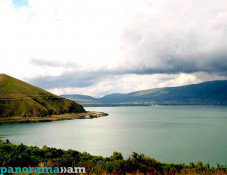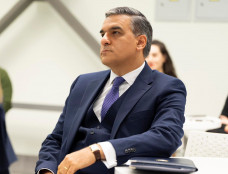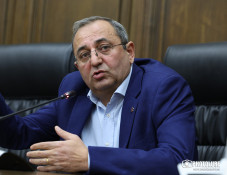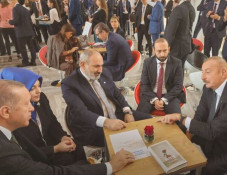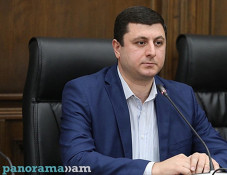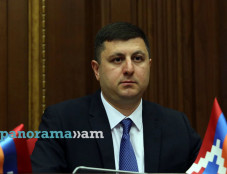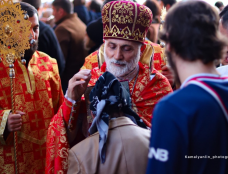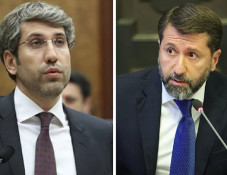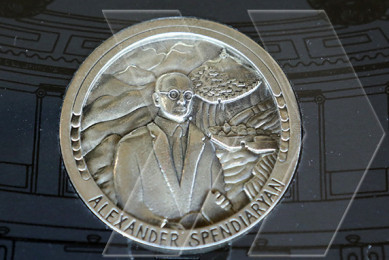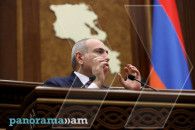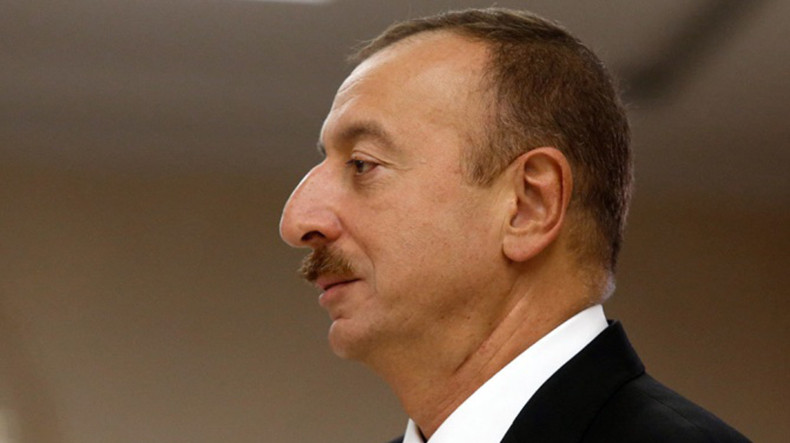
Lithuanian newspaper Voruta: We advise pro-Azerbaijani media to take closer look at Azerbaijani president’s xenophobic speeches
Lithuanian monthly newspaper Vorutapublished an article dedicated to Armenian national hero GareginNzhdeh. The article is sort of an answer to several articles of anti-Armenian character published in the Lithuanian media.
GareginNzhdeh is a hero, who devoted his entire life to the protection of the right of the Armenian nation to exist, as well as to the struggle against the Turkish expansion and overcoming the consequences of Turkey’s genocidal politics against the Armenians. The newspaper writes that Nzhdeh is a hero, whose memory is sacredly reverednot only by the residents of Armenia, but also by the representatives of the Armenian Diaspora, as well as by the descendants of the Armenians, who fought against the Nazi Germany.
“In the modern world, one can often see that instead of appeals for collaboration, mutual understanding, and dialogue among various nations and cultures, numerous institutions and individuals make the opposite statements. They consistently distort both historical facts and today’s reality, as well as attempt to form a negative picture of one nation (the Armenian) in the other (the Lithuanian). The recent articles in the Lithuanian media, which havea strongly marked anti-Armenian character, are a good example of this,” the article reads.
Reportedly, one of the articles mentioned above presents the Armenians and, particularly, one of the most glorious and popular heroes of the Armenian nation – GareginNzhdeh – in an extremely negative light.
The newspaper notes that one may not pay any attention to such articles, as the defamation of GareginNzhdeh, the obvious distortion of facts, the accidental or not accidental use of the theses of the Azerbaijani agitprop may only cause a bitter grin in people familiar with the issue and the historical period.
According to the information, the authors of such articles claim that Nzhdeh allegedly had meetingswith Hitler, however, there is no historical proof of that and there cannot be any. Another thesis claiming that Nzhdeh liked to repeat: “The one, who dies for Hitler, dies for Armenia” often swirls. However, in reality, GareginNzhdeh never said such a phrase, and the phrase attributed to him is as follows: “The one, who dies for Germany, dies for Armenia.” However, the phrase is only attributed to Nzhdeh, and was not pronounced by him. It is impossible to see such a thought in Nzhdeh’s works (including the ones written in 1930-40s)and in the archival documents of his interrogations in the People's Commissariat for Internal Affairs of the Committee for State Security. Hovhannes Devedjian, whohas never liked Nzhdeh and testified against him in August 1947 in the NKVD-KGB, ascribed the phrase to Nzhdeh (see V. Hovsepyan, GareginNzhdehand KGB, Yerevan 2007, p. 20-24). Devedjianalso pressed unfounded charges against Nzhdeh, which were only based on gossip and speculation.
It is highlightedin the article thatNzhdeh’s ideology was never Nazi or fascist. GareginNzhdeh always strongly condemned xenophobia, national vanity, cruelty, and violence.
The Armenian Legion led by GareginNzhdehdid not participate in military operations and was in the rear mainly in France, Holland, and Poland, and this is also a historical fact. The fascist authorities never trusted the Armenian Legion. On December 12, 1942, Hitler said: “Despite Rosenberg and militaries’ assurances, I do not trust the Armenians.” Moreover, the members of the Armenian Legion never missed the possibility to move to the side of the anti-Hitler forces or unite with the resistance movements of the Western Europe. The Armenian war prisoners played an important role in the liberation of the Southern France, while another group of Armenian war prisoners rebelled in Holland.
On the contrary, the Azerbaijani Legion, which was included in the German Wehrmachtand was four times bigger than the Armenian one, was notorious for its participation in the mass killings of the Polish people and Jews. It was particularly involved in the suppression of the Warsaw Uprising, during which the detachments of the Azerbaijani Legion participated not only in the fighting against the rebelled Polish people, but also in the mass killings of the civilians in the Warsaw region Wola, which led to the murder of up to 40,000 civilians: women, children, elderly people, even patients of the hospital.By the way, MammadRasulzadeh – the former president of the Democratic Republic of Azerbaijan (1918-1920)–who is a hero in that country spared no effort in recruiting the Azerbaijani war prisoners in the ranks of the Nazi army.
“It is quite regrettable and surprising that the authors, who write about Nzhdeh, allow themselves to preach the Armenian nation and criticize the current Armenian social and political life.The theses about the Armenians’ pretensions over the territories of other countries, particularly Georgia, or about the Armenian terrorism and violence only raise a laugh,” the article notes.
As for the violence and xenophobia in the regional context, Voruta advises the pro-Azerbaijani media to take a closer look and cover in the upcoming articles the actions of the Azerbaijani president IlhamAliyev. In his speeches, “the Armenians are declared as the greatest enemy, and the territory of the Republic of Armenia is called a historical part of Azerbaijan.” The honorary title of a national hero is awarded to cutthroat RamilSafarov, a person, who axe-murdered a sleeping Armenian man during NATO courses. Another Azerbaijani soldier is awarded only because he cut off the head of a Yazidi soldier in the style of the IS terrorists and proudly demonstrated his “trophy” on camera during the Azerbaijani aggression against Artsakh on April 2-5 2016.
GareginNzhdeh (GareginTer-Harutyunyan, 1886-1955) was a prominent Armenian military and politician, hero and thinker. He was the author of several works including “The Struggle of Sons against Fathers,” “Autobiography,” “The Motive of the Soul of the Nation,” “My Answer,” “Open Letters to the Armenian Intelligentsia,” “Some Pages from my Diary,” etc. G. Nzhdeh’s ideology and philosophy are deeply revered by the Armenian nation.
Newsfeed
Videos





